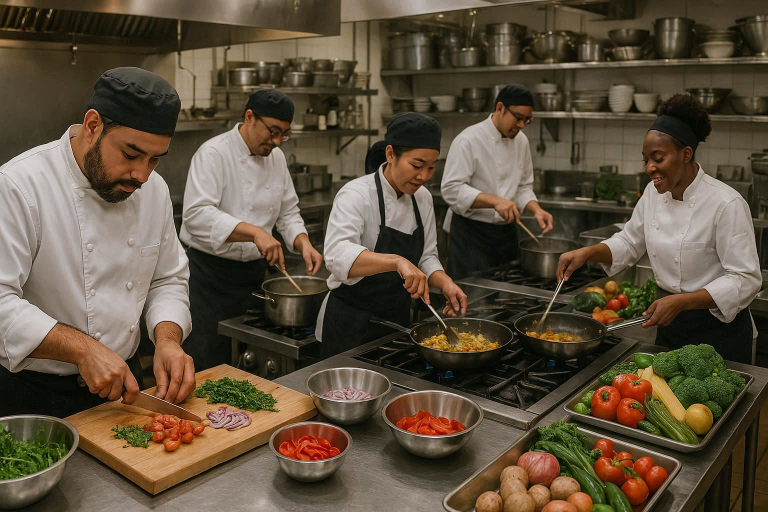If you’ve noticed the explosion of food trucks, delivery-only restaurants, and meal-prep services, you’re not alone. The food industry has shifted dramatically in the past decade. Customers want convenience, variety, and innovation — and that demand has given rise to a new kind of food business model.
But here’s the catch: starting a restaurant or food business is expensive. The cost of building a commercial kitchen, securing permits, and maintaining equipment can be overwhelming. That’s where commissary kitchens come into play.
A commissary kitchen is a shared, licensed commercial kitchen space that entrepreneurs can rent instead of building their own. Think of it as a co-working space, but for chefs, bakers, and food creators. These kitchens are designed to meet health and safety standards while giving food businesses access to professional-grade equipment and storage.
For modern food entrepreneurs, commissary kitchens aren’t just a convenience — they’re often the launchpad for success. Let’s break down what commissary kitchens are, who uses them, and the Home Organization Ideas for Kitchen powerful benefits they bring to the table.
What is a Commissary Kitchen?
Basic Definition
A commissary kitchen is a licensed, commercial-grade kitchen facility that multiple businesses share. Unlike a home kitchen, these spaces are fully equipped with professional ovens, stovetops, refrigerators, and storage areas. They’re designed to meet health codes and allow food Best Frying Pan For Induction Cooktop entrepreneurs to operate legally without investing hundreds of thousands of dollars in their own kitchen build-out.
How It Works
Most commissary kitchens operate on flexible rental models:
- Hourly rentals for occasional users, like weekend bakers or pop-up chefs.
- Daily rentals for caterers who only need the space during events.
- Monthly packages for growing businesses that need regular access.
Importantly, commissary kitchens also handle compliance with local health regulations. That means the facility is already licensed and inspected, making it easier for you to operate without worrying about whether your workspace is up to code.
Who Uses Commissary Kitchens?
Commissary kitchens serve a wide variety of food businesses. Here’s who benefits most:
Food Trucks
Most food trucks can’t prepare everything in their vehicles — space is limited, and local laws often require food trucks to prep in a licensed kitchen. A commissary kitchen gives them prep space, storage, and a cleaning station to stay compliant and efficient.
Caterers
For caterers, events can range from a wedding for 200 guests to a small corporate lunch. Commissary kitchens provide large-batch cooking space and storage, helping them scale up or down depending on the gig.
Bakers & Meal Prep Services
Bakers often need specialized ovens and proofing equipment, while meal prep businesses require lots of refrigerator space. Commissary kitchens are ideal because they offer professional tools without the upfront cost.
Ghost Kitchens & Delivery-Only Restaurants
The rise of apps like Uber Eats, DoorDash, and Grubhub has fueled delivery-only restaurants, also known as ghost kitchens. Many of these businesses run entirely from commissary kitchens, reducing overhead while focusing solely on delivery orders.
Food Startups & Entrepreneurs
Launching a new food concept? Commissary kitchens let entrepreneurs test recipes, sell products at farmers’ markets, or run pop-ups without the risk of a full-scale restaurant investment.
Powerful Benefits of Commissary Kitchens
Cost Savings
Opening a commercial kitchen can cost $250,000 or more. Commissary kitchens slash those costs. Instead of buying equipment, securing permits, and paying for utilities, you pay a rental fee. That means more money for marketing, ingredients, and growth.
Flexibility & Scalability
Need the kitchen three days this week and seven next week? No problem. Commissary kitchens offer flexible scheduling so you can scale operations up or down depending on demand.
Compliance & Safety
Food safety regulations can be complex. Commissary kitchens are already certified and regularly inspected, ensuring you stay compliant. This is particularly helpful for small businesses unfamiliar with local laws.
Networking & Collaboration
Commissary kitchens are hubs for entrepreneurs. Working alongside other food businesses often sparks collaborations — think a baker teaming up with a caterer for an event, or a food truck sourcing desserts from a fellow tenant.
Access to Resources
Beyond ovens and prep tables, many commissary kitchens provide:
- Dry, cold, and frozen storage
- Packaging stations
- Distribution support (some even connect with delivery platforms)
- Business services like marketing help or mentorship
Challenges of Using Commissary Kitchens
Like any shared space, commissary kitchens come with a few drawbacks.
Scheduling Conflicts
If you need the kitchen during peak hours, you may face competition from other businesses. Booking in advance is often necessary.
Limited Customization
Because the space is shared, you can’t redesign the kitchen layout or permanently install personal equipment.
Privacy & Space
Working in a shared environment means adjusting to other chefs prepping nearby. For some, this can affect workflow or creativity.
How to Choose the Right Commissary Kitchen
Not all commissary kitchens are created equal. Here’s what to consider:
Location & Accessibility
Choose a commissary close to your target market, suppliers, or event venues. Saving time on travel means more efficiency.
Equipment & Amenities
Make sure the facility offers the specific tools your business needs — whether that’s convection ovens, walk-in freezers, or packaging areas.
Rental Terms & Costs
Compare hourly vs. monthly pricing. Some kitchens offer membership packages that include discounts, storage, or priority scheduling.
Community & Added Services
A good commissary kitchen isn’t just about equipment — it’s about support. Some provide mentorship, networking events, or marketing help, which can be invaluable for startups.
Conclusion
A commissary kitchen is more than just a space to cook — it’s a lifeline for food entrepreneurs. By reducing startup costs, providing professional-grade tools, and ensuring compliance, commissary kitchens help businesses thrive in a competitive food landscape.
Whether you’re running a food truck, catering business, or launching a delivery-only restaurant, commissary kitchens offer the flexibility and resources you need to succeed without overwhelming financial risk.
If you’re ready to take your food idea from dream to reality, exploring commissary kitchens could be the smartest first step.
FAQs About Commissary Kitchens
Q1: What’s the difference between a commissary kitchen and a ghost kitchen?
A commissary kitchen is a shared, licensed facility where multiple businesses cook. A ghost kitchen is a delivery-only restaurant model that often rents space in a commissary.
Q2: Do I need a license to work in a commissary kitchen?
Yes. While the commissary itself is licensed, you’ll still need food handler certifications and business licenses to operate legally.
Q3: How much does it cost to rent a commissary kitchen?
Prices vary by city and services offered. Expect $20–$50 per hour, or monthly memberships ranging from a few hundred to several thousand dollars.
Q4: Can I run my full-time food business from a commissary kitchen?
Absolutely. Many catering companies, meal-prep businesses, and delivery-only restaurants run entirely from commissary kitchens.
Q5: What equipment is usually provided in a commissary kitchen?
Most include:
- Ovens, stovetops, and grills
- Refrigerators and freezers
- Prep tables and sinks
- Dry and cold storage
Q6: Are commissary kitchens only for small businesses, or do larger brands use them too?
Both. While they’re popular with startups, many established brands use commissary kitchens to test new concepts or expand into new markets.
Q7: Can food trucks legally operate without using a commissary kitchen?
In most cities, no. Health departments often require food trucks to prep and clean in a licensed commissary kitchen to maintain compliance.

